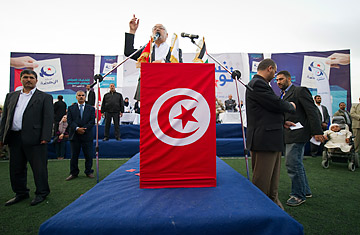
Rached Ghannouchi, the founder and leader of the Ennahda Islamist movement, speaks during a meeting in Ben Arous (southern Tunis) on Oct. 21, 2011
The République area of downtown Tunis is filled with the markers of a democracy in the making. Banners for the Modernist Democratic Pole, a coalition of leftist parties, compete for the attention of passersby with a honking parade of cars flying flags of the Islamist Ennahda party. Nearly everyone in Tunisia's busy capital says they plan on voting in the first real democratic election in the country's history, to be held on Sunday, Oct. 23. And if the populace is unused to voting — it rarely participated in the sham democracy of ousted President Zine el Abidine Ben Ali — it is getting a lot of help. For example, an entire wall of an apartment building above the République train tracks is devoted to showing how it's done. "I put the paper in the ballot box," reads step 10 on the illustrated chart.
But politics is complicated. More than 100 parties are vying for spots in the assembly that will write the country's new constitution. Many of them are unknown to voters, having sprouted in the democratic free-for-all that followed the revolution. "I have my ID card, and I'm going to vote. I've been waiting for it my whole life," says Rizqi Habib, a retired painter. But he has no idea whom he'll vote for. "I'm not going to lie to you," he says. "I can't read. So it will be random. I'm going to just make an X."
Still, Tunisians are among the best-educated people in the Arab world, and the country has a well-developed middle class. Those two factors, combined with a relatively smooth transitional period in the months following their dictator's Jan. 17 ouster (compared with those of their revolutionary counterparts in Egypt and Libya) poise Tunisia to be the Arab Spring's most likely success story.
But Tunisians are not without worry. "The regime was responsible for the absence of any dialogue between the Islamists and others," says Emna Jebloui, an activist at the Arab Institute for Human Rights in Tunis. "And now we are paying the price for the absence of that debate." Jebloui is one of many Tunisians who have grown fearful of the postrevolution emergence of Islamists and their seemingly broad appeal in what has typically been North Africa's most secular country. Ben Ali had repressed extreme religiosity so intensely that the months after the revolution marked the first time, some Tunisians said, that they had seen women wearing the niqob, the all-encompassing black face veil that is more commonly associated with the conservative Islam of Saudi Arabia.
But nine months after the revolution, Islamists appear poised to claim the largest chunk of the seats in the constitutional assembly. The most popular Islamist party, Ennahda, is considered moderate, even liberal, by regional standards of political Islam. Many of its new adherents are educated youth. But for Tunisians who value the rights to drink alcohol, read Western literature and mingle with the opposite sex, the rise of any kind of Islamism is alarming. "The Islamists will try to add that Shari'a be one source or a major source of legislation," predicts Hamadi Redissi, a political-science professor at the University of Tunis El Manar, who has written critically of Ennahda.
And then there are other challenges. Some Tunisians, including Ennahda leader Rached Ghannouchi, have warned of vote rigging by former regime sympathizers, many of whom have joined new parties. Young revolutionaries, meanwhile, object to any participation by ex–regime members in the new Tunisia's politics. Others fear violence will ensue if results are displeasing to one party or another. And still others worry that even if elections run smoothly, the assembly's primary task of drafting a new constitution within a year will prove too onerous for the diverse array of parties and independent candidates that are sure to wind up in the 217-seat assembly.
The transitional leaders ultimately chose an electoral model that would ensure that no single party could dominate in a period of democratic fragility, Jebloui says. But parties and politicians have found a way around it. "Tunisians are too smart, and they can do independent lists," she says. "There are many independent lists that will have an alliance with Ennahda after the election."
Indeed, the latter point underscores a national rift that goes beyond religiosity. Ghannouchi has confidently predicted a 50% win for Ennahda — a percentage that is possible only with a coalition of like-minded independents. But it's not Ghannouchi and the Ennahda elite — returning from abroad and from prison sentences after decades of Ben Ali's rule — liberal intellectuals fear most; it's their appeal. "Desperate people. The young and maybe fragile. Unemployed also," says Jebloui, listing the sorts of voters who have found the Islamists so enticing. "They have much time, and they haven't enough money to go to the cinema, to read books, to go outside to other countries," she says. "They don't have many solutions. So maybe they find in religion the magical solution."
